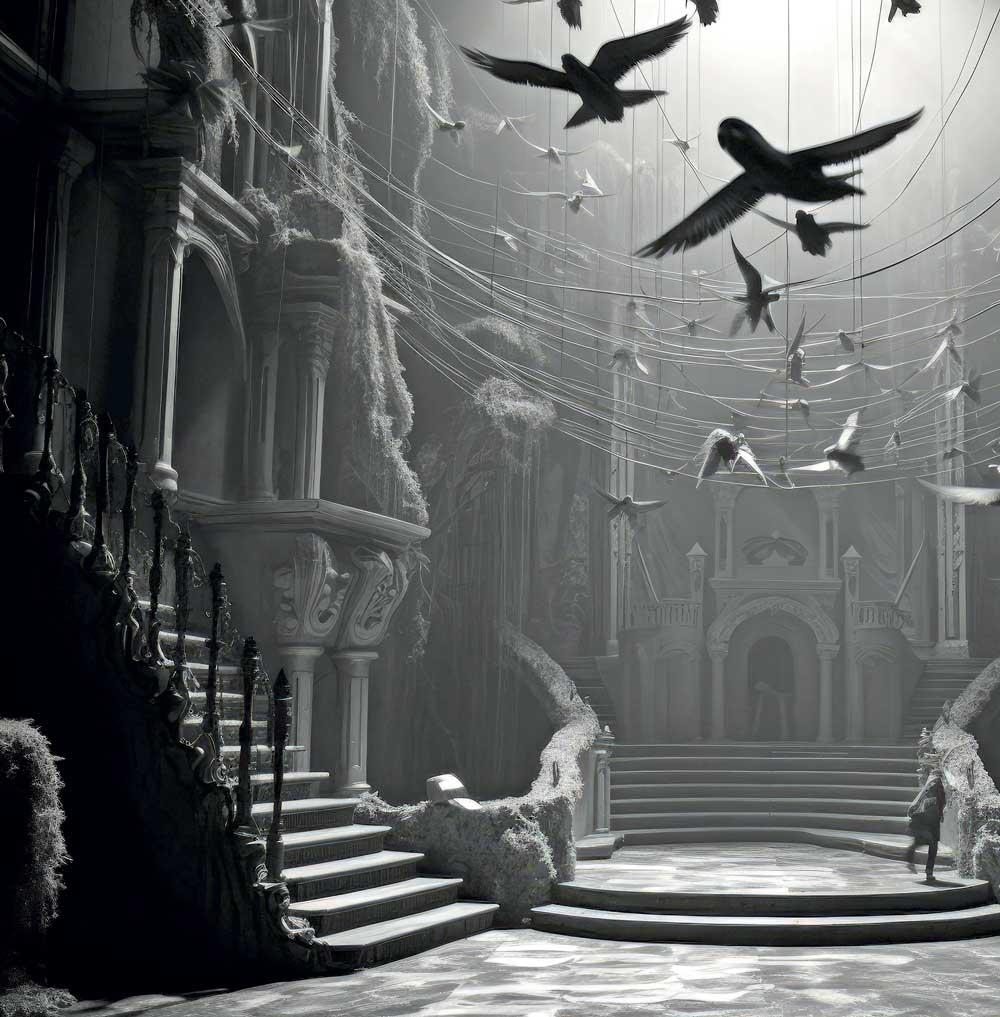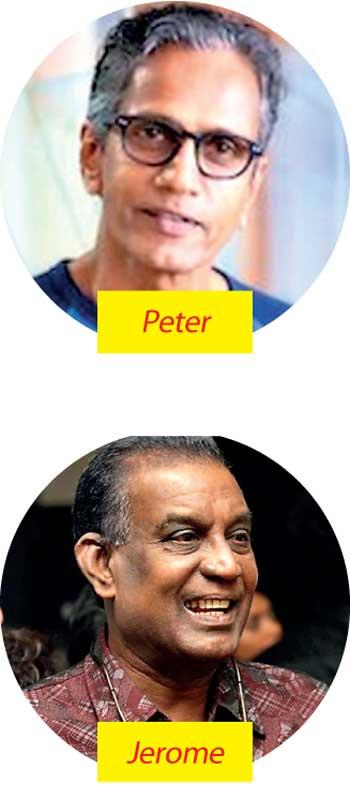A recollection of cancelled acts and forgotten scripts


 Thinking about our past we often dwell on certain events with a sense of regret. These regrets are often balanced with thoughts of how different our personal histories, experiences and relationships would have been had things turned out differently. As a person who was involved in the theatre during the 70’s and 80’s, I witnessed some extraordinary moments on and off stage which have influenced my life immeasurably. But enmeshed amongst these memories are a few wonderful pieces of theatre and some riveting performances that never really made it on to the stage.
Thinking about our past we often dwell on certain events with a sense of regret. These regrets are often balanced with thoughts of how different our personal histories, experiences and relationships would have been had things turned out differently. As a person who was involved in the theatre during the 70’s and 80’s, I witnessed some extraordinary moments on and off stage which have influenced my life immeasurably. But enmeshed amongst these memories are a few wonderful pieces of theatre and some riveting performances that never really made it on to the stage.
The reason that I want to highlight a series of such events is to understand the reasons why they had to be shelved, and why no one thought of finding suitable alternatives which would have made these dreams come true. Having witnessed some of these projects gaining momentum until they suddenly folded up and after having spoken to a few friends who experienced similar disappointments I have realised that there is a wide range of issues that those in the performing arts have not yet faced up to or dealt with. This has led me to believe that the customary practice of risk assessments should also be applied to theatrical ventures especially in an artistic climate where there is little support and so much division and rivalry.
Before identifying the challenges faced by those in this field, I’ll first reflect with nostalgia on these abandoned projects, thinking, “If only these plays had been staged...”
Soon after the resounding success of ‘Evita,’ which was directed by Graham Hatch, he was ready to stage a production of Tennessee Williams’ brilliant play ‘Suddenly Last Summer’ with a superb cast that included Michelle Leembrugan, Yolande Abeyweera, Richard de Zoysa, and Steve de la Zilwa. I remember attending many of the rehearsals which took place in the massive garage at Lionel Peiris’s house situated at the far end of the road right next the old Green Cabin. Graham who was directing and designing this production was drawing out extraordinarily powerful performances from this group of highly skilled actors. The scenes during which Michelle as Catherine Holly and Yolande Abeyweera as Mrs Venable clashed with each other were so filled with tension that the air between them crackled and every pause felt like a taut wire! As her character required, Michelle who chain-smoked throughout the play brought a nervously charged sexuality to her performance which was unforgettable. Yolande who was playing the wheelchair bound Mrs Venable was equally convincing in her role which contained a sense of threat and sheer evil in every line she delivered.
It was a privileged to have watched these actresses both of whom were at the height of their powers, rehearsing with such conviction. Performances such as these are rare to come by and it seems a great pity that the wider public couldn’t witness it. Three weeks prior to going on the boards the production was cancelled. Yolande had pulled out due to professional reasons, and the play was never performed.
 A few years after this disappointing experience Graham started working on Robert Bolt’s ‘A Man for all Seasons.’ I saw the meticulous work he put into designing the costumes and the sets which were just astoundingly beautiful. The cast he had assembled for this production was some of the best actors available in Colombo.
A few years after this disappointing experience Graham started working on Robert Bolt’s ‘A Man for all Seasons.’ I saw the meticulous work he put into designing the costumes and the sets which were just astoundingly beautiful. The cast he had assembled for this production was some of the best actors available in Colombo.
Richard de Zoysa was cast in the lead role as Sir Thomas More, Jagdesh Mirchandani, fresh from his brilliant performance as Macbeth in the Inter School Shakespeare Drama competition, was playing Thomas Cromwell, Chanaka Amaratunge was due to play Cardinal Wolsey. Suresh Thambipillai was the Duke of Norfolk and Michelle was cast in a minor role as Alice Moore. I was reading for the role of William Roper and Peter D’Almeida had been approached to play the opportunistic Richard Rich. Graham had cast himself in the small part of Henry the eighth, gleefully admitting to everyone that he had designed the most elaborate costume for himself. The initial readings that took place in his house were just electrifying. The potential for something fantastic to take place was palpable, until without any prior notice Graham informed us that he was not able to progress with the production due to extenuating circumstances. Soon after this we learnt that he was going through a separation and that he had to devote his time to care for his daughter.
One of the first things I did when I saw ‘Death and The Maiden’ at the Royal Court Theatre in London in 1991 was to buy the script and send it to Sri Lanka. Ariel Dorfman’s play which is set in Chile during Pinochet’s terrifying regime was timely and reflected the political issues many Sri Lankans were experiencing at that time. Steve de la Zilwa did his best to bring this great piece of theatre to the stage in Colombo. Unfortunately, after a few readings and rehearsals he abandoned this project. I understand that he had no other option due to the lack of rehearsal spaces in Colombo. The house that he was using for the rehearsals was adjacent to a space which was being used by adults with intellectual and developmental disabilities who were undergoing music therapies. The sounds emanating from this space next door made it impossible for the actors to concentrate on their performances.
Prior to achieving his remarkable success of winning an Olivier award Hiran Abeysekera was instrumental in bringing the script of Stephan Adly Guirgis’s superb play ‘The Last Days of Judas Iscariot’ to Colombo and asking Steve de la Zilwa to direct him in it. Without any hesitation Steve assembled a fantastic cast which included Hiran, Peter D’Almeida, Jagdesh Mirchandani, Nimmi Harasgama and began readings with the hope of getting this wonderful piece of writing on to the stage. Everyone who attended these readings confirmed that they were utterly inspiring.
Speaking to Nimmi recently I found out that looking after her one-year-old son was a responsibility that clashed with her desire to commit completely to this project. Her withdrawal from this play was the key reason that halted its progress.
Readings had also begun for a production of David Mamet’s ‘Oleanna,’ a play about a university professor accused of sexual harassment by a female student. Written in 1992, this piece remains highly relevant today, because it anticipated the themes which were later amplified by the Me-Too movement. This two hander was due to be performed by Rohan Ponniah and Nimmi Harasgama. However, the absence of a suitable director to steer them and balancing their own careers against the commitment required for such an intense undertaking made this yet another dream that faded.
Sadly, many of these wonderfully talented actors are no longer with us, yet quite a few are, and every effort should be made not to let them gather dust much like these discarded scripts. Their ability to perform has not diminished and all of them are more than capable of delivering some stellar performances should the opportunity be afforded to them.
 The examples I have chosen highlight some of the issues that have to be considered and addressed by anyone who is hoping to produce a piece of theatre.
The examples I have chosen highlight some of the issues that have to be considered and addressed by anyone who is hoping to produce a piece of theatre.
Career advancement always takes precedence over activities that one does for pleasure, unless of course you are a professional who has a contractual obligation. Personal or extenuating circumstances are bound to intervene, and these life changing challenges take priority as they are unavoidable. Parenthood trumps everything else and anyone concerned with the welfare of their own child will always make it their primary concern and even put their own careers on hold. For those in the arts, securing support is especially difficult, particularly for works that are politically charged or thought-provoking. Actors involved in such projects need a specific environment which helps their concentration enabling them to reach their full potential. Without this they lose their focus.
The lack of understudies is another key issue that needs to be addressed. I feel that this is because no one wants to play a secondary role to another who is chosen to revel in the limelight. This can only be resolved if the understudies are given at least one chance to perform. We must recognise the enormous contribution made by Jerome de Silva who has led the way and tackled this problem effectively. Many of his productions with the Workshop Players have had multiple casts that include actors/singers who can step into any of the roles whenever they are called to do so ensuring that the show does go on.
Finding a dedicated ensemble focused solely on the success of a production has become a challenge too. The rivalries, divisions, and egos within our theatre fraternity are so rife that there a complete lack of trust and no goodwill whatsoever.
There are actors who are notoriously difficult to work with. Some demand the spotlight but are unwilling to share the space with those who are of equal importance to the work at hand. There are those who think of themselves only in leading roles which restricts their own careers. I recall Richard de Zoysa giving me a great piece of advice saying, “you can steal a show with the smallest of parts if you do it well” and he was a splendid example of this.
There are directors who demand slavish obedience from their actors. This in turn creates factions and is very unhealthy for the entire industry. Many talented actors are considered persona non grata just because they have worked with a rival faction or because their commitment is not seen as total. Re-engaging with someone who is dictatorial even if they are the best at their profession is often daunting to anyone who has once been ostracised.
The drama backstage often eclipses the one onstage, but this is the reality caused by many who have placed themselves on pedestals of their own making. Cutting one’s nose to spite one’s face has always been a reason that unity has never been possible in the small pond that Colombo is. It is likely to remain so until the physicians heal themselves. Then and only then will many of these dreams become a reality.










